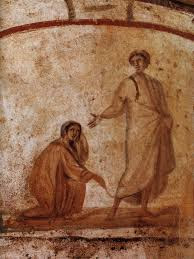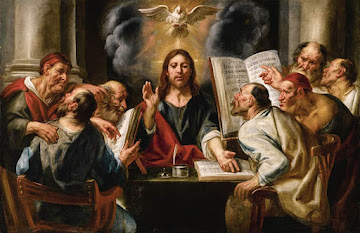Today’s Gospel reading continues the Farewell Discourse (John ch. 13-17). Jesus says to the disciples “Do not let your hearts be troubled.” This of course echoes what He says elsewhere, such as in the Sermon on the Mount. In Matthew 6, we hear “do not be anxious for your life, what you will eat, and not for your body, what you will wear…” When we think about the ‘hard’ sayings of Jesus, teachings that seem very difficult, if not impossible, for us to actually do, the discourses on worry are probably near the top. I think it’s easier to love our enemies and give them the shirt off our backs than it is to quiet our anxiety.

It’s important to note that anxiety about life is not a modern phenomenon. Jesus spoke these words to a first-century audience. In our day, we face the same problems, manifested differently. We worry about money and taxes. Our country and children. We get bombarded with inbound messages and communications, and then communications about how much we are getting bombarded with messages perpetuating the worship of material goods. We hear and think too much about ‘technology’ and all its wonders. We are inundated with the ideas of ‘progress’ we have made as a human society. Perhaps in some areas of life, there has been some progress, depending on how this term is defined, as well as the basis for comparison. Another topic for another time. In any event, where no progress has been made at all is reducing human anxiety. Our hearts are troubled about much. The default human condition post-Fall is worry. It seems to fit with the narrative of being banished from paradise and toiling for our next meal. We sing for our supper. We worry about whether we will hit the right notes and if the audience will put bread in our jar. But Jesus comes to rectify this. In Christ, we no longer need to labor under the heavy burden of a troubled heart.
In the direst moment before proceeding to His agony and passion, Jesus understands the concern His disciples have and reminds them to have faith. To trust in God fully is the surest path to relieve the weight of worry. Alas, like many aspects of the faith, our first thought is that this is easier said than done. It sounds like a platitude. “Don’t worry, be happy!” Who can do that? Importantly, who can actually be that way? The short answer, I think, is no one. At least no one without the help of the Holy Spirit.
We need our minds and hearts prepared fully by the grace of God to let go of what concerns us, for it is all in God’s hands if we are truly honest. With the help of the Holy Spirit, we are able to take proper stock of ourselves and realize our need for humility. In turn, this leads to a deeper realization of our creatureliness. From here, we must come to terms with how little we ultimately control. It is our zeal for control and our dissatisfaction with anything less than omniscience that drives us to worry so much. If we listen to Jesus, He speaks to us the same words He spoke to His disciples “let not your hearts be troubled.”
When I was in grade school, we learned the old Shaker song “Simple Gifts.” I find myself surprised that the lyrics and melody come so easily to mind, and also saddened that I forget them so often.
'Tis the gift to be simple, 'tis the gift to be free,
'Tis the gift to come down where we ought to be,
And when we find ourselves in the place just right,
'Twill be in the valley of love and delight.
When true simplicity is gain'd,
To bow and to bend we will not be asham'd,
To turn, turn will be our delight,
Till by turning, turning we come round right.















